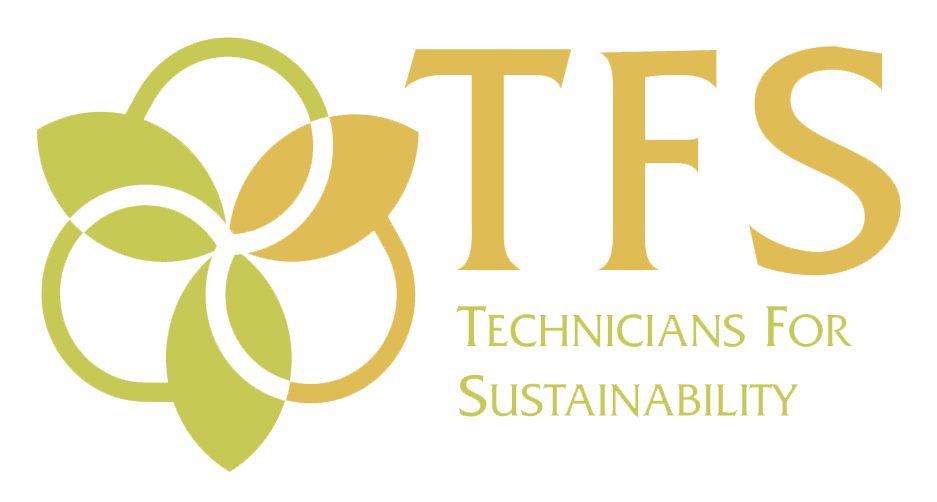For Immediate ReleaseContact: Nicole Koch
Office: 520-740-0736
Email: nicole@tfssolar.com
Technicians For Sustainability & Easter Seals Blake Foundation Celebrate Installation of State-of-the-Art Solar Parking Shade Structures
Over $600,000 in utility savings for the non-profit projected over 20 years
TUCSON, Ariz. (November 7, 2013) – Easter Seals Blake Foundation, one of Southern Arizona’s largest non-profits, will be celebrating the completion of a new solar parking shade system with a public open house and reception on November 14th at their new headquarters, 7750 East Broadway Blvd. Tucson-based solar company, Technicians For Sustainability (TFS), designed and installed this 346 kW system, which covers over 100 parking spaces, to power the Foundation’s 50,000 square foot campus.
The steel structures provide shade for a large portion of the parking lot and incorporate high-efficiency solar panels made by industry-leader SunPower®. Notably, using these high-efficiency SunPower®panels allowed TFS to design a system that will deliver over 30 percent more energy than conventional panels would allow at this site.
Easter Seals Blake Foundation CEO Ema Kammeyer said, “Technicians For Sustainability have a vast comprehension of this technology, yet they convey it seamlessly to non-tech audiences. They really made it accessible and understandable for our board to have complete confidence in moving forward with this installation. True professionals.”
While cost has long been perceived as a barrier to “going green”, Technicians For Sustainability assisted the Easter Seals Blake Foundation in securing financing for the project that, due in part to federal and TEP incentives, will have no upfront costs to the organization. Also, the Foundation reports it anticipates that after eleven years the cost of electricity at the campus will be virtually nothing, with a projected $600,000 - $1,000,000 in savings over the next twenty years alone. The savings would be enough to offset state budget cuts and provide 50 working poor families, every year, with tuition assistance to its nationally accredited childcare program.
In addition to the financial benefits, the move to solar reinforces Easter Seals Blake Foundation’s organization-wide mindset of environmental accountability.
"Tucson will be a better place to live because of the forward looking vision of organizations like Easter Seals Blake Foundation,” said TFS President, Kevin Koch. “Not only are they lowering their operating costs for the long term, enabling them to serve the community more effectively, but they are building a cleaner future for our community by producing their electricity with solar energy.”
Easter Seals Blake Foundation’s Solar Open House and Reception is Thursday, November 14 from 4:30 to 6:30pm at their headquarters, 7750 East Broadway Blvd. For more information, or to RSVP for the event please contact Jennifer Turner at jturner@blake.easterseals.com.
###
About Technicians For Sustainability
Technicians For Sustainability (TFS) is a locally owned, mission-driven business, committed to walking their talk. They provide businesses, public institutions, and residential homeowners with high quality, clean, renewable energy systems, helping to translate environmental values into practical reality. The company employs proven technologies to meet customers’ specific needs, including solar electricity and solar water heating. TFS has installed over 7 megawatts of solar power in southern Arizona. For more information about Technicians For Sustainability visit www.tfssolar.com.
About Easter Seals Blake Foundation
Easter Seals Blake Foundation has been providing services to children and adults with disabilities since 1950. Their educational, therapeutic and community living programs are designed in accordance with their mission: to enable each individual served to discover and meet his or her maximum potential for independent, productive living and developmental growth. For more information please visit www.blakefoundation.easterseals.com.
About SunPower®
SunPower Corp. (NASDAQ: SPWR) designs, manufactures and delivers the highest efficiency, highest reliability solar panels and systems available today. Residential, business, government and utility customers rely on the company's quarter century of experience and guaranteed performance to provide maximum return on investment throughout the life of the solar system. Headquartered in San Jose, Calif., SunPower has offices in North America, Europe, Australia, Africa and Asia. For more information visit www.SunPowercorp.com.
About the project
Tucson Electric Power estimates that a project of this type results in the following environmental savings:
- Water NOT used in the production of electricity: 27,700 gallons/month
- Coal NOT burned to produce electricity: 55,410 lbs/month
- Carbon Dioxide NOT emitted into the atmosphere: 123,400 lbs/month
- Lifetime benefit to air quality is equivalent to planting 2,482 trees


































